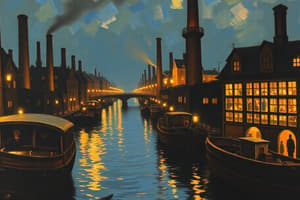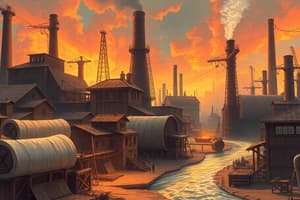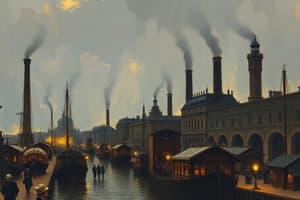Podcast
Questions and Answers
The Industrial Revolution began in Great Britain in the late 18th century.
The Industrial Revolution began in Great Britain in the late 18th century.
True (A)
Crop rotation and selective breeding had a negligible impact on food production during the Industrial Revolution.
Crop rotation and selective breeding had a negligible impact on food production during the Industrial Revolution.
False (B)
The steam engine utilized oil as its primary fuel source for industrial advancement.
The steam engine utilized oil as its primary fuel source for industrial advancement.
False (B)
Mass migration during the Industrial Revolution often led to overcrowded and unhealthy living conditions in urban areas.
Mass migration during the Industrial Revolution often led to overcrowded and unhealthy living conditions in urban areas.
The long working hours for factory workers during the Industrial Revolution were generally between 10 to 12 hours a day.
The long working hours for factory workers during the Industrial Revolution were generally between 10 to 12 hours a day.
Industrial pollution and urban crowding are ongoing issues as a result of industrialization.
Industrial pollution and urban crowding are ongoing issues as a result of industrialization.
Entrepreneurial ambitions were not a significant factor in the initiation of the Industrial Revolution.
Entrepreneurial ambitions were not a significant factor in the initiation of the Industrial Revolution.
Liberalization of industrial policies had a restrictive effect on industrial growth.
Liberalization of industrial policies had a restrictive effect on industrial growth.
Flashcards are hidden until you start studying
Study Notes
Overview of the Industrial Revolution
- Transition from agrarian and handicraft economies to industrialized machine manufacturing.
- Originated in Great Britain in the late 18th century; spread to Europe and the United States by the mid-19th to early 20th centuries.
- Marked by radical economic, social, and technological changes.
Key Innovations
- The steam engine played a vital role in industrial development, primarily fueled by coal and iron.
- Advancements in agriculture, such as crop rotation and selective breeding, significantly increased food production, supporting population growth.
Causes of the Industrial Revolution
- Government liberalization of industrial policies nurtured industrial growth.
- Technological advancements revolutionized power sources, manufacturing processes, communication, and transportation.
- Entrepreneurial efforts were essential in inspiring innovations that prompted the Industrial Revolution.
- Shift from handcrafted goods to machine-produced items in factories heightened efficiency and product availability.
Consequences of the Industrial Revolution
- Wealth became more widely distributed, with a notable increase in international trade.
- Major migration from rural areas to urban centers in search of factory jobs led to overcrowding and poor living conditions.
- Increased production rates due to machinery resulted in lower prices for goods and greater capital for factory owners.
- Factory workers, including men, women, and children, faced excessive working hours (14 to 16 hours daily for six days a week) under often hazardous conditions.
Negative Effects
- Industrial pollution emerged as a significant concern, along with urban overcrowding tied to industrial growth.
- Industrialization introduced critical social challenges, such as dangerous working environments and inadequate wages.
Economic Shift from 1750 to 1900
- In 1750, economies were primarily agrarian, featuring concentrated wealth and limited inter-regional trade due to poor transportation.
- By 1900, a transition to manufacturing economies had occurred, resulting in a broader wealth distribution and the growth of the middle class.
- Growth of the factory system employed large numbers, including many women and children, under difficult labor conditions.
- Development of transport systems, including steam locomotives, enhanced connectivity and boosted commerce.
Studying That Suits You
Use AI to generate personalized quizzes and flashcards to suit your learning preferences.





